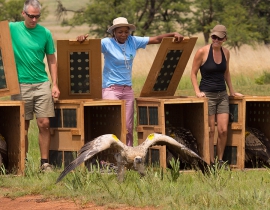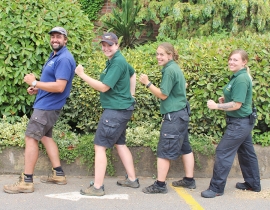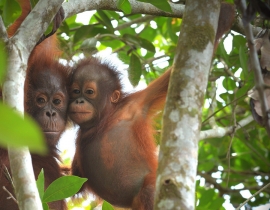Posted June 9, 2016 in All
In spite of the Cape vulture being one of the most researched and documented vulture species in southern Africa, its numbers continue to decline. Vulture Conservation is vital to the ecological welfare of southern and greater Africa. Vultures are a significant marker of the health of any ecosystem to which they are native. They are able to ingest and metabolise food from carcasses that died from disease without ill effect, thus removing vectors from the environment, for example, Anthrax which has horrific implications for human and domesticated animal life in Africa and the world in the event of an outbreak. They also dispose of carcasses, which have other health implications for the environment and a resulting knock on effect to the agricultural and eco-tourism industries in Africa.
Formerly found throughout southern Africa, Cape vultures now only breed in South Africa, Lesotho and Botswana. Without intervention, the chance of losing Cape vultures, and other vulture species throughout Africa, is a very real possibility. Threats such as power line electrocutions and collisions, and irresponsible use of poisons by farmers and now more directly by poachers (due to direct persecution of vultures to wipe them out as they indicate poached animals to park rangers) are particularly contributing to their continuing decline.
In 2015 alone, 59 known vultures became victims of power line fatalities and injuries in South Africa, while a total of 123 known vultures were poisoned and found dead. Many more (hundreds) were additionally killed by the cyanide poisoning in Zimbabwe in October. Of the 75 vultures collected or brought in to VulPro in 2015, 64 (85%) had some level of mechanical injury with 29 of these attributed to power line collisions, 5 (6 %) showed evidence of poisoning and 6 (8 %) were victims of electrocution.
The most feasible way to estimate the trend in Cape vulture numbers is to examine information from the relatively few breeding colonies monitored on a regular basis over an adequate time period. Having said that, to-date VulPro is the only organisation in South Africa undertaking concise and continuous monitoring of several of the Cape vulture colonies, making up an estimated 60% of the total population. In May 2016, Vulpro initiated the first of the counts for the 2016 breeding season, which saw an increase on some of the counts from last year, but the full trends will not be determined until all of the counts have been conducted.
In addition, VulPro monitor the power lines in the vicinity of the surveyed colonies to determine the degree of threats these structures present to the vultures. Data from these surveys help us offer recommendations to the electric utility company in line with already approved and recognised ‘bird-friendly’ structures and to encourage the use of bird flappers and spirals to deter powerline collisions by vultures. Sadly in 2016, these threats are continuing, for example, along one 3km powerline surveyed in March, 48 electrocuted Cape vultures were found and, in May, VulPro found another 20 electrocuted vultures.
Action for the Wild first supported VulPro in 2015 and, in June, we will be donating £5,000 to enable them to continue their vital work in surveying populations of this important, endangered species to help mitigate the threats they face.



